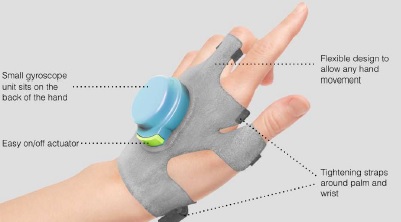Two of the South East’s most-promising young inventors have been recognised at this year’s AXA PPP Health Tech & You Awards, which took place at BAFTA.
Imperial College London students, Joon Faii Ong and Lise Pape, were shortlisted at the prestigious healthcare event, with Pape eventually coming away with first prize.
Both of their inventions could help revolutionise the lives of people with Parkinson’s disease.
The awards, now in their second year, are a joint initiative led by AXA PPP Healthcare; the thinktank, 2020health; and the Design Museum. The aim is to guide and grow the conversation about health technology, empowering people everywhere to use technology to lead healthier lives and be more in control of their health and wellbeing.
Ong and Pape were shortlisted after taking part in MedTechSouthEast, an accelerator programme from the Design Council and MedCity which helps medtech entrepreneurs develop and commercialise products focused on independent living.
The independence and freedom inventions like these can give to people with debilitating conditions is inspiring
Around 10 million people worldwide, and 127,000 people in the UK, are affected by Parkinson’s, a progressive neurological condition that affects movement. There is currently no cure for the disease, and medication used to control it can have side effects including involuntary movements and impulsive behaviour. The two innovations are drug-free, which could save millions on expensive medication and avoid sometimes-significant side effects.
Winner Pape’s design is the Path Finder shoe, which helps people who suffer from ‘freezing of gait’, described as feet remaining ‘glued to the floor’. 38% of people with Parkinson's disease suffer from falls each year. Falls represent the most-frequent and serious type of accident in people aged 65 and over, and currently cost the NHS £2.3billion every year.
Pape’s company, Walk with Path, has developed a solution in shoes mounted with lasers, which project green lines ahead as the person walks, activated by a sensor in each heel that monitors the user’s walking pattern and pace. The shoe produces a line that provides a visual cue to step ‘over’.
Ong’s device is an unobtrusive glove that aids people with debilitating hand tremors.
A medical student at Imperial College London, he devised the idea of the GyroGlove after seeing an elderly woman with Parkinson’s struggle to feed herself in hospital due to severe hand tremor. The glove uses gyroscopic engineering principles mixed with hi-tech sensors to counteract the tremors and stabilise the hand. The effect feels akin to moving one’s hand in thick treacle, where deliberate movement is permitted, but tremors are dampened.
He said: “The MedTechSouthEast programme has significantly aided GyroGear in the design process and on our route to manufacture.
“We are indeed fortunate to have a potentially-impactful invention; yet it takes critical, industry-specific knowledge to fulfil that potential and turn the GyroGlove from a prototype into a commercial product.
“We could not be more grateful for the contacts and support with the programme, and we most certainly look forward to working with Design Council as we further refine the GyroGlove.”
Entrepreneurs are absolutely critical to our healthcare ecosystem – people who can recognise a need, come up with an innovative solution and take it all the way from concept to product
He believes the device will restore independence and improve quality of life over the long term for people with Parkinson’s because, unlike medication, the device does not have side-effects, does not lose efficacy through ongoing use, and does not require a specialist prescription.
It is also significantly cheaper than conventional therapies, with an estimated one-off cost of around £600 per device, compared to an average annual drug cost £17,763 per patient in the UK.
Parkinson’s currently costs the economy £2billion a year in the UK, and with the amount of people who will have the disease set to at least double by 2030, GyroGlove could represent a technological and economical breakthrough.
Design Council chief executive, John Mathers, said: “The independence and freedom inventions like these can give to people with debilitating conditions is inspiring. Their combination of entrepreneurial spirit and designer’s minds are truly innovating the healthcare landscape. It’s a fine example of how design can improve lives, and Design Council is proud to have helped them on their way to market.”
James Freeston, marketing director at AXA PPP healthcare, added: “The Independent Living category was incredibly tough to call, with so many inventive entries from Design Council’s MedTechSouthEast programme.
“Lise’s innovative thinking around how to tackle trips and falls in people with Parkinson’s was particularly creative, and we’d like to congratulate her again and wish her the best on the journey of getting this possibly life-changing device to market.”
And Sarah Haywood, chief executive of MedCity, said: “These are two great, simple innovations that have the potential to have a massive impact on people’s lives.
“Entrepreneurs like Faii and Lise are absolutely critical to our healthcare ecosystem – people who can recognise a need, come up with an innovative solution and take it all the way from concept to product. It’s their energy and enthusiasm that will deliver better healthcare and at the same time boost our economy.”

The GyroGlove
